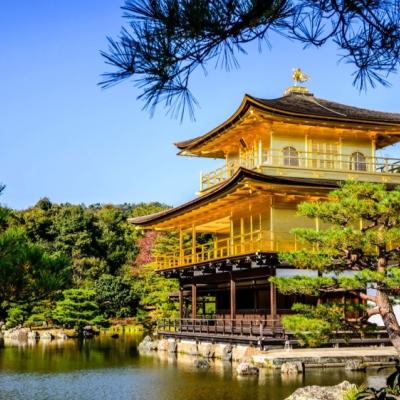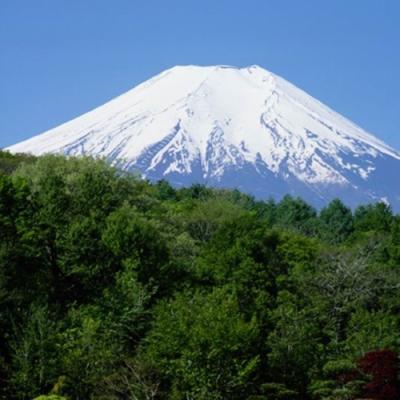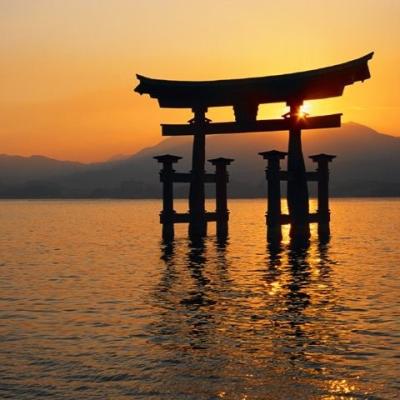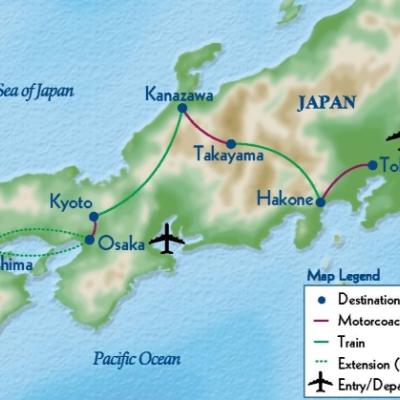It’s a fascinating land of delicate art and bustling commerce, of rich traditions and dizzying modernity – all revealed on this well-crafted small group tour. See Tokyo and Kyoto’s highlights, engage in local life, and head off the beaten path to the lovely historic cities of Takayama and Kanazawa.
The journey begins with three nights in amazing Tokyo, where, along with time to explore independently, touring includes a preeminent calligrapher’s gallery, the imposing Imperial Palace, tranquil Meiji Shrine, the famed Ginza district, and the impressive Tokyo National Museum. Japan’s pastoral side is on tap next in stunning Fuji-Hakone-Izu National Park with majestic Mt. Fuji and a scenic cruise on Ashi Lake. After an overnight stay at a traditional ryokan inn, board an express train to Takayama in the Japanese Alps to explore this ancient town during a two-night sojourn. A traditional tea ceremony and a cooking class offer opportunities to experience Japanese culture firsthand. Visit historic Shirakawago Village, a UNESCO site. Reaching culturally rich Kanazawa for a two-night stay, tour famed Kenrokuen Garden, visit a gold leaf museum, and see the Higashi Chayagai teahouse area. The journey ends with three nights in Kyoto, Japan’s cultural center. Among many highlights here: the beloved Golden Pavilion temple, Ryoan-ji temple with its acclaimed Zen garden, and the extravagant 17th-century Nijo-jo Castle. Visit the otherworldly Arashiyama Bamboo Grove, the important Fushimi Inari shrine, and Nishiki Market, “Kyoto’s Kitchen.”
- International flight to Tokyo, Japan
- Transfer (included with air package) to hotel
- No planned activities or plans due to scattered arrival times
- Morning briefing to meet Tour Director
- Tour Tokyo: Meiji Shrine, gallery of calligrapher Koshun Masunaga, Ginza
- Afternoon at leisure
- Welcome dinner
- Tour Tokyo: Imperial Palace, East Gardens, Buddhist Asakusa Kannon, Nakamise shopping arcade, Tokyo National Museum
- Afternoon and evening at leisure
- Depart Tokyo for Fuji-Hakone-Izu National Park
- Visit Mt. Fuji World Heritage Center
- Cruise on Ashi Lake
- Arrive in Hakone
- Night in a ryokan after a Kaiseki dinner
- Bullet train and Wide View Hida express train to Takayama
- Tour the San-machi-suji district
- Attend a traditional Japanese tea ceremony
- Visit riverside Miyagawa Morning Market
- Prepare lunch together
- Walking tour of Takayama: Takayama Jinya, local sake brewery, Takayama’s old town
- Depart Takayama for UNESCO World Heritage site of Shirakawago Gassho-zukuri Village
- Visit Gokayama Village
- Arrive in Kanazawa
- Tour Kanazawa: Kenrokuen Garden, Ishikawa Gate, Hakukokan museum, the Higashi Chayagai teahouse and geisha area
- Visit Kutani Kosen Kilm
- Depart Kanazawa by train.
- Visit Kinkaku-ji and Ryoanji
- Evening at leisure
- Tour Kyoto: Arashiyama Bamboo Grove, Kyoto Museum of Traditional Crafts, Nijo-jo Castle
- Afternoon at leisure
- Tour Kyoto: Fushimi Inari shrine, Sanjyusangendo Hall, Nishiki Market
- Afternoon at leisure
- Farewell dinner
- Transfer by motorcoach to Osaka for international return flights to U.S.
Plus: Visit cosmopolitan Hiroshima, reborn from its atomic destruction, with an optional 3-day/2-night post-tour extension.
*Note: Some details subject to change prior to program - travelers will be notified of significant alterations to program details.
Moderate
- Traveling by train between cities
- Shifting lodging every 1-3 nights
- Daily walking tours through cities and towns
Faculty




